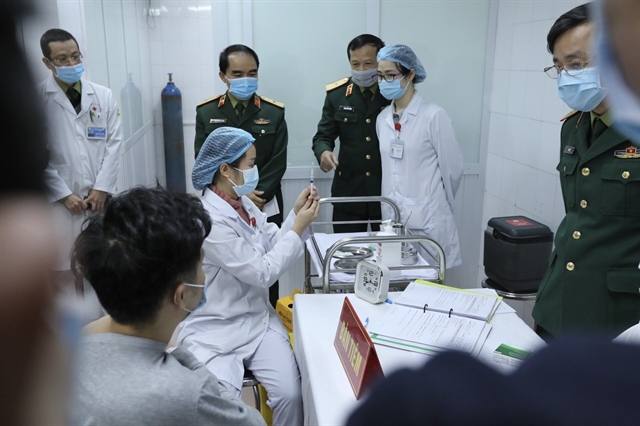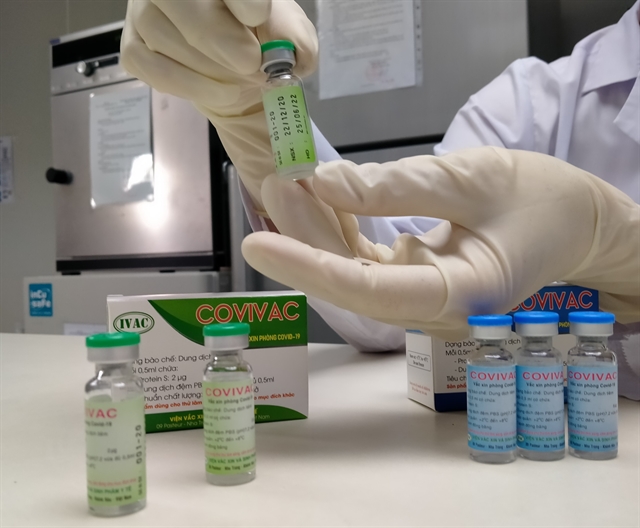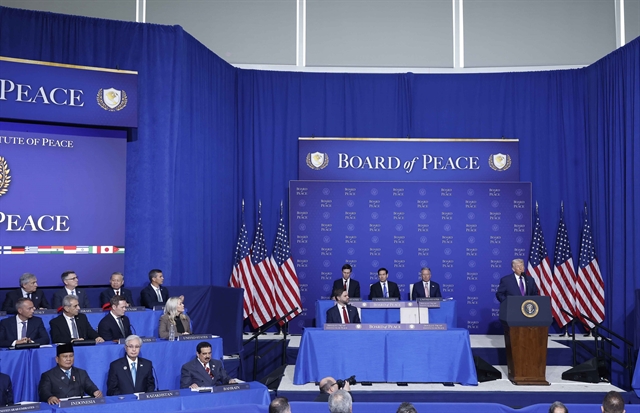.jpg) Society
Society
.jpg)

|
| A doctor at the Military Medical University prepares a shot of Nanocovax. — VNA/VNS Photo |
HÀ NỘI — Twenty volunteers on Wednesday received the second shot of a homegrown COVID-19 vaccine at the Military Medical University in Hà Nội.
Seventeen of them were given a 25mcg dose of Nanocovax, Việt Nam’s first candidate vaccine against SARS-CoV-2 to reach the human trial stage.
Three others received a 50mcg dose of Nanocovax. They were given the first shot on December 26, 2020.
A total of 60 volunteers, aged 18-50, were selected for the first phase of Nanocovax’s clinical trials. They are divided into three groups for receiving three doses of 25 mcg, 50 mcg and 75 mcg, respectively. The vaccination consists of two injections 28 days apart.
Among 20 candidates of the 25mcg dose group, three were injected with the second dose on January 14. All of them are now in stable condition.
Việt Nam has so far gone more than halfway through the first human trial phase of Nanocovax.
Dr Hồ Anh Sơn, deputy director of the Institute of Biomedicine and Pharmacy, said: “The tests on the seventh, fourteenth and twenty-eighth days after the injection showed the vaccine had good immunity against the virus and ensured safety. After the second shot, the level of antibodies will continue to increase by four to five times, even 20 times.”
The research team will continue to study and propose to the Ministry of Health the appropriate doses for the second human trial phase, which is expected to begin immediately after the Lunar New Year (in the middle of February), he said.
The Military Medical University has received applications from more than 500 people who want to participate in the Nanocovax clinical trial. More than 200 people have come for medical screening.
Among them, 51 volunteers are eligible for the first trial phase. The number of qualified volunteers is small because compared to the criteria for selecting volunteers of many major pharmaceutical companies, Việt Nam requires stricter criteria, he said.
The criteria for volunteers will be expanded in the second phase which is expected to be tested on 400 to 600 people, aged 12-17.
The HCM City Pasteur Institute and the National Institute of Hygiene and Epidemiology will participate in the second phase with the Military Medical University.
It is expected that the third phase will start when phase 2 goes halfway, expanding on the scale of 10,000 to 30,000 people, starting from August 2021. If the pilot study goes smoothly, the first of Việt Nam’s homegrown vaccines will be launched in early 2022.
In a related move, the health ministry has approved the human clinical trial of Covivac, the Việt Nam’s second homegrown vaccine developed by Nha Trang-based Institute of Vaccines and Medical Biologicals (IVAC).

|
| Covivac is the Việt Nam’s second homegrown vaccine developed by Nha Trang-based Institute of Vaccines and Medical Biologicals (IVAC). — VNA/VNS Photo |
The trial will be carried out after the Lunar New Year on about 120 volunteers by IVAC, the National Institute of Hygiene and Epidemiology and the Hà Nội Medical University.
There will be three phases of the trial on groups of volunteers. Each group will be injected with two shots of 1mcg and 3mcg 28 days apart.
The research team is scheduled to recruit volunteers on Thursday.
Meanwhile, the third COVID-19 vaccine developed by Việt Nam is scheduled to be tested on humans at the end of March, the Ministry of Health said on Tuesday.
The vaccine is developed by Vaccine and Biological Production No 1 (VABIOTECH).
Illegal entries pose risks
Minister of Health Nguyễn Thanh Long on Wednesday raised concerns over illegal entries from aboard, which poses COVID-19 infection risks to Việt Nam.
At a virtual national conference on COVID-19 prevention and control on Wednesday, the minister said the health ministry had consulted with the Prime Minister on limiting entries at airports. However, the infection risk comes from illegal entries through road borders. Some countries in the region still operate commercial flights so many Vietnamese people take flights to those countries and enter Việt Nam through road borders.
“About 100 illegal entries are reported each day on average, even reaching 500 cases per day,” said Long.
It is reported that ten localities have coach operators pick up passengers, take them across the border and skip quarantine. Passengers connect with coach operators through social media to discuss illegal entrance, he said.
Minister Long ordered local authorities to crack down and impose strict penalties on illegal entry rings. The National Steering Committee on COVID-19 Prevention and Control has encouraged people to report illegal entries that skip quarantine.
Families must commit to not welcoming relatives who enter the country illegally and avoid quarantine.
He noted that the whole community must stay vigilant and be prepared for any case of community infection. “If we find any new infection case, we must immediately quarantine the case, remove the infection source from the community as quickly as possible,” he said. — VNS
.jpg)



